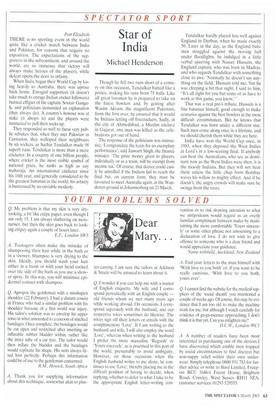Star of India
Michael Henderson
Port Elizabeth THERE is no sporting event in the world quite like a cricket match between India and Pakistan, for reasons that require no exposition. The expectations of the supporters in the subcontinent, and around the world, are so immense that victory will always make heroes of the players, while defeat opens the door to infamy.
When India began their World Cup by losing heavily to Australia, there was uproar back home. Enraged supporters (it doesn't take much to enrage Indian cricket followers) burned effigies of the captain, Sourav Ganguly, and politicians demanded an explanation (they always do). A country's honour was at stake (it always is) and the players were instructed to pull their socks up.
They responded so well to these very public rebukes that, when they met Pakistan in Centurion, they walloped their neighbours by six wickets, as Sachin Tendulkar made 98 superb runs. Tendulkar is more than a mere cricketer. In a country of one billion people, where cricket is the most visible symbol of national pride, he ranks as high as any maharaja. An international cricketer since his 16th year, and generally considered to be the greatest batsman in the world, his artistry is buttressed by an enviable modesty. Though he fell two runs short of a century on this occasion, Tendulkar batted like a prince, making his runs from 75 balls. Like all great batsmen he is prepared to take on the finest bowlers and, by getting after Wasim Akram, the magnificent Pakistani, from the first over, he ensured that it would be Indians letting off firecrackers. Sadly, in the city of Ahmedabad, a Muslim enclave in Gujarat, one man was killed as the celebrations got out of hand.
The response of the politicians was instructive. 'I congratulate the team for an exemplary performance', said Jaswant Singh, the finance minister. 'The prize money given to players, individually or as a team, will be exempt from income tax.' Of course, that decree could easily be annulled if the Indians fail to reach the final but, on current form, they must be favoured to meet Australia again, at the Wanderers ground in Johannesburg on 23 March.
Tendulkar hardly played less well against England in Durban, when he made exactly 50. Later in the day, as the England batsmen struggled against the moving ball under floodlights, he indulged in a little verbal sparring with Nasser Hussain, the England captain, who was born in Madras, and who regards Tendulkar with something close to awe. 'Normally he doesn't say anything on the field,' Hussain told me, 'but he was chirping a bit that night. I said to him, "It's all right for you but some of us have to work at this game, you know."
That was a real pro's tribute. Hussain is a fine batsman himself, good enough to make centuries against the best bowlers in the most difficult circumstances. But he knows that Tendulkar was born under a different star. Such men come along once in a lifetime, and we should cherish them while they are here.
India have won the World Cup once, in 1983, when they deposed the West Indies at Lord's in a low-scoring final. If anybody can beat the Australians, who are as dominant now as the West Indies were then, it is the moody Indians. But they will not beat them unless the little chap from Bombay waves his willow to mighty effect. And if he doesn't, the angry crowds will make sure he swings from the trees.


































































 Previous page
Previous page